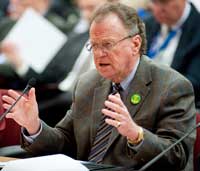Greening an Economy with the Blues
Tennessee's challenge during these difficult economic times is in maintaining a good pace of new job creation in concert with refining a statewide energy strategy with innovative ideas in training and research.
by James G. Neeley* | October 2010 | print pdf |
When I was a young man, I worked in a textile factory in Huntingdon as a spindle boy. Back then, manufacturing was king, and those jobs were available to anyone who had a strong back and a willingness to work. Obviously times have changed, but the importance of manufacturing and job availability is just as great today. We know green and clean-energy jobs will be part of the new economic portfolio of the state, but how we nurture this new industry will determine how well it produces results for the laborers of the future.
Investments
Tennessee already has a strong foundation of investments in emerging-technology projects related to energy production and energy efficiency.
- Volkswagen is a billion-dollar investment creating high fuel efficiency diesel vehicles that will employ approximately 2,000 with an additional 500 in supplier jobs created in the Chattanooga area.
- Nissan's all-electric car, the LEAF, will be produced at Nissan's vehicle assembly facility in Smyrna beginning in 2012. The LEAF and lithium-ion battery production will create up to 1,300 jobs when the plants are operating at full capacity.
- The Hemlock Semiconductor site in Clarksville is expected to employ more than 500 people, with an additional 800 when expanded. Construction of the site will employ 1,000 workers during the next five to seven years.
- Wacker Chemie AG polycrystalline silicon manufacturing plant's investment in Cleveland is anticipated to create approximately 500 new jobs.
- Confluence Solar Inc. announced in January that it would build a facility in Clinton to produce silicon ingots, which are components for the solar industry. The 200,000-square-foot facility is projected to create 250 jobs.
It is conservatively estimated that at least 6,000 jobs will be created directly as a result of these investments. Additional indirect jobs will subsequently be created through the expansion of supplier industries.
Grants
It's no coincidence that grants are helping drive the enthusiasm for green and energy-related investments.
- The American Recovery and Reinvestment Act (ARRA) provided more than $1 billion in initial funding for Tennessee's green job related projects. The largest initial grant was awarded for environmental cleanup at Oak Ridge including the East Tennessee Technology Park, ORNL, and Y-12 sites.
- Another ARRA project included $99 million for home energy efficiency programs that trained and certified 500 licensed contractors to provide the work and resulted in 6,400 homes weatherized by June 30.
- In the past year, the Tennessee Department of Labor has received other grants to enhance workforce development in the green jobs sector. In November 2009, the USDOL awarded a $5.5 million, three-year Green Jobs Training Program Grant to provide training to approximately 4,000 Tennesseans for energy efficiency, renewable energy, and other green jobs. The grants are directed to training programs at universities, community colleges, and technology centers as well as to private sector educators. Training opportunities differ by local area but include Pre-Apprenticeship Construction Training, LEED Certification, Certified Green Professional Training in architecture, training for energy auditors to assess residential and industrial electric energy consumption, and training in the installation and operation of solar, geothermal, wind turbine, biofuel, and other developing green technologies.
Tennessee is currently conducting a comprehensive business survey funded by a Labor Market Information Improvement Grant to identify green jobs in Tennessee. The USDOL granted $765,000 to process more than 6,000 surveys sent to Tennessee employers. The surveys focus on economic activity in the energy efficiency, renewable energy, and pollution reduction and remediation industries as well as identifying occupations and skill requirements within those industries. The results will project what jobs will be available one year from now. The survey will be completed in May 2011 and will be available at www.sourcetn.org. Half of the grant funding will be used to improve job seeker and employer services in Tennessee, including examining possibilities for dislocated auto industry workers to transition to green jobs. The grant establishes a partnership with Middle Tennessee State University's Business and Economic Research Center (BERC) to conduct impact studies on the six groundbreaking green industry investments in Tennessee (Hemlock, Wacker, Volkswagen, Nissan, eTec, and the Volunteer State Solar Initiative). MTSU's research will provide estimates of the projected number of new jobs that might be created and retained by these new investments.
Partnerships
Regional public-private partnerships within industry sectors have been found to be engines of economic growth that can direct training resources to the most critical areas.
- The state is building essential partnerships with Nissan and TVA for the development of electric cars and electric charging capability, with Oak Ridge National Laboratory (ORNL) and 13 other partners on biofuels, and with TVA and NES on retrofit projects. Additional projects with ORNL include the solar research facility.
- An important example of a public-private partnership in Clarksville is the development of the Hemlock facility. Partners include the company, Austin Peay State University (APSU), the Tennessee Board of Regents, the State of Tennessee, and the City of Clarksville. The company has built a classroom building on the campus of APSU to be used for the chemical technology program that will supply workers for the facility.
- On June 22, 2010, I dedicated the Tennessee Technology Center at Dickson's Green Sustainable Energy Campus. Partners at the site include Workforce Essentials and the Tennessee Career Center at Dickson. The solar instructor at the Green Campus is one of the few certified instructors in the state.
- Knoxville is one of America's 25 Solar Cities. With funding from the U.S. Department of Energy's Solar America Initiative, the city is working to make solar energy cost competitive by 2015. The City of Knoxville is partnering with TVA, the Knoxville Utilities Board, ORNL, and the Southern Alliance for Clean Energy to promote solar energy sources, educate the public and businesses, and build solar facilities.
With all of these new green job initiatives, program evaluations are necessary to capture what is found to be the most effective in job creation efforts. Tracking the number of jobs is important. Calculating savings and payback periods for investment in energy efficiency and renewable energy is also vital for attracting further private investment. When estimates of green jobs become available, supply and demand analysis will be used to compare the number of jobs with the number of people completing training to determine gaps or excess supply.
Tennessee's challenge during these difficult economic times is in maintaining a good pace of new job creation in concert with refining a statewide energy strategy with innovative ideas in training and research. Tennessee has a great foundation in these areas, and as consumer confidence increases, all of these factors could very well come together to create a momentum that will drive our local economy for years to come.
* James G. Neeley is the commissioner of the Tennessee Department of Labor and Workforce Development.



